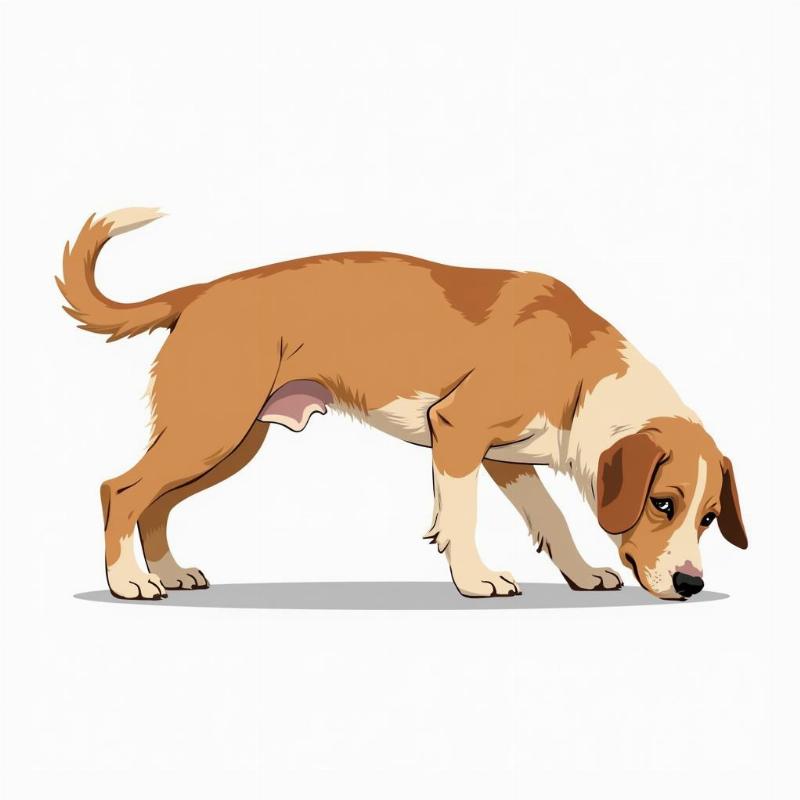Male dog peeing on himself can be a distressing sight for any owner. This behavior, while sometimes simply messy, can often signal an underlying medical issue or a behavioral problem. Understanding why your male dog is urinating on himself is the first step towards addressing the issue and ensuring his comfort and well-being.
Medical Reasons Why Your Male Dog Pees on Himself
Several medical conditions can contribute to a male dog urinating on himself. Urinary tract infections (UTIs) are a common culprit, causing frequent urination and discomfort. Incontinence, often seen in older dogs, can also lead to involuntary leakage. Other conditions like bladder stones, diabetes, kidney disease, and even cognitive decline can also manifest in inappropriate urination. If your dog suddenly starts peeing on himself, a visit to your veterinarian is crucial for a proper diagnosis and treatment plan.
Behavioral Factors Contributing to Self-Soiling
While medical issues are often the primary cause, behavioral factors can also play a role. Submissive urination, where a dog urinates when feeling anxious or intimidated, is one such example. Excitement urination, common in puppies, can also lead to accidents, even in older dogs. Marking behavior, while less likely to result in self-soiling, can sometimes lead to a dog inadvertently urinating on his front legs.
 Dog Showing Submissive Behavior
Dog Showing Submissive Behavior
Diagnosing the Cause of Self-Soiling in Male Dogs
Determining the root cause requires careful observation and veterinary examination. Your vet will likely perform a physical exam, urinalysis, and possibly blood tests to rule out any medical conditions. Providing your vet with a detailed history of your dog’s behavior, including when the self-soiling started, how often it occurs, and any other accompanying symptoms, is essential for accurate diagnosis.
Treatment Options for Male Dogs Urinating on Themselves
Treatment will depend on the underlying cause. For medical conditions like UTIs, antibiotics are typically prescribed. Managing incontinence may involve medications, dietary changes, or even surgery in some cases. Behavioral issues often require a combination of training techniques, environmental modifications, and possibly medication to address anxiety or other underlying emotional factors.
Preventing Your Male Dog from Peeing on Himself
Maintaining good hygiene by regularly cleaning your dog’s prepuce can help prevent infections. Providing a clean and comfortable living environment, along with regular potty breaks, can also minimize accidents. For behavioral issues, positive reinforcement training and creating a stress-free environment are key.
Frequently Asked Questions
- Why does my older male dog suddenly pee on himself? This could be due to age-related incontinence, cognitive decline, or other medical conditions. A vet visit is recommended.
- How can I clean my dog after he pees on himself? Use pet-safe wipes or a damp cloth to clean the affected area.
- Is self-soiling in male dogs always a medical problem? Not always. Behavioral issues like submissive or excitement urination can also contribute.
- Can training help with self-soiling? Yes, especially for behavioral causes. Positive reinforcement can be very effective.
- What should I do if my dog starts peeing on himself more frequently? Consult your veterinarian immediately as this could indicate a worsening medical condition.
- Are certain breeds more prone to self-soiling? Smaller breeds can sometimes be more prone to submissive urination.
- Can neutering help with marking behavior that leads to self-soiling? Neutering can sometimes reduce marking behavior, but it’s not a guaranteed solution.
Connect With Beautdogs.us For More Expert Advice
We understand how concerning it can be when your male dog starts peeing on himself. Beautdogs.us is your trusted source for comprehensive dog care information, breed-specific advice, and product recommendations. We cater to both new and experienced dog owners, offering expert insights and practical tips to ensure your furry friend’s health and happiness. For personalized advice or further assistance, contact us at [email protected] or call us at +1 501-555-7529.